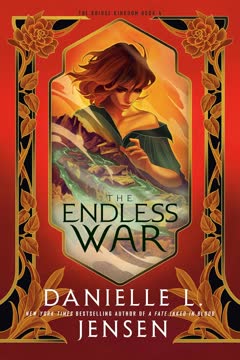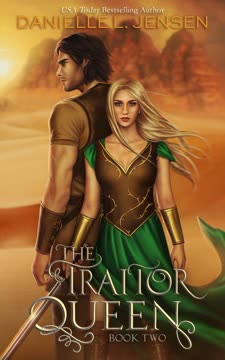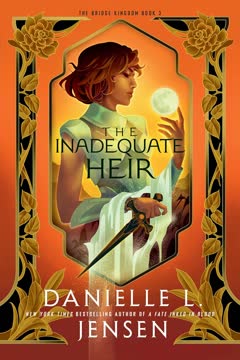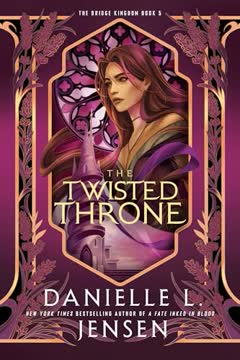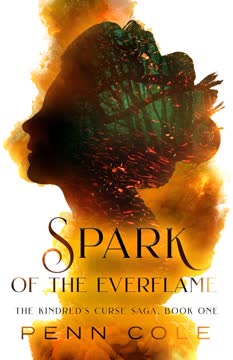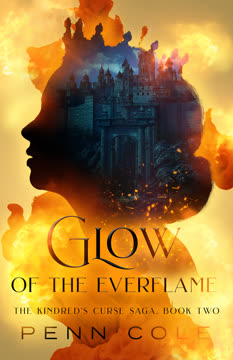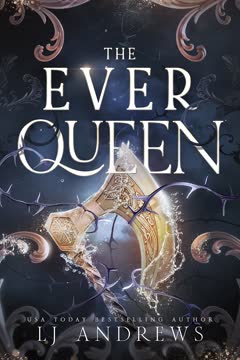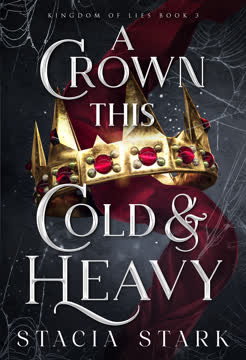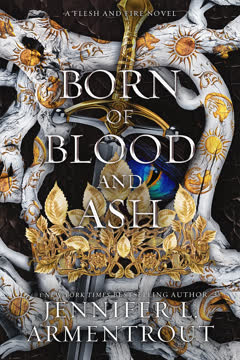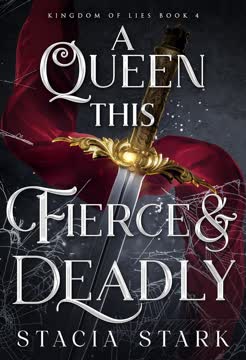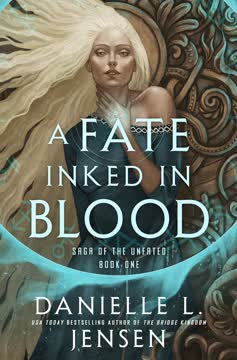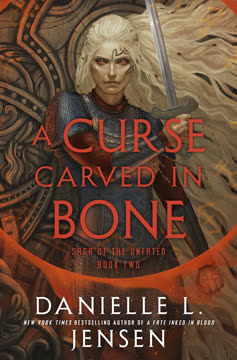Plot Summary
Storms and Betrayals
Empress Petra's betrayal sends Zarrah, her niece and chosen heir, into exile on Devil's Island, accused of treason for loving Keris, the King of Maridrina. As Zarrah is shipped through violent seas, she's haunted by memories of her forbidden love and the political machinations that have turned her into a pawn. Petra's obsession with war and vengeance, and her need to control Zarrah, are revealed in a chilling confrontation. Zarrah's sense of self fractures as she's forced to confront the consequences of her choices, the pain of Keris's supposed betrayal, and the looming threat of a prison from which no one has ever escaped.
Devil's Island Descent
Upon arrival, Zarrah is thrust into the infamous Devil's Island, a prison for Valcotta's worst criminals and political enemies. She's quickly caught between rival factions: one led by the brutal Kian, the other by the enigmatic Daria. The island is a microcosm of Valcotta's suffering, with hunger, violence, and cannibalism lurking in the shadows. Zarrah must navigate the treacherous social order, survive the elements, and come to terms with her own guilt and anger. Her resolve is tested as she realizes that her imprisonment is not just punishment, but a calculated move in Petra's endless war.
Chains of the Past
In Maridrina, Keris reels from Zarrah's fate, tormented by nightmares and the burden of kingship. His court is a nest of vipers, with rivals and would-be usurpers circling. Keris's attempts to rescue Zarrah are stymied by storms, political realities, and the knowledge that Petra wants him to act rashly. His relationship with his young sister Sara and the manipulative Lestara reveals the personal costs of power. Keris's internal conflict—between love and duty, between the legacy of his monstrous father and his own ideals—drives him toward a desperate alliance with Ithicana.
Prisoners and Cannibals
Zarrah's days become a fight for survival as she learns the true nature of Devil's Island. Daria's tribe, once rebels, have been forced into cannibalism by Petra's deliberate starvation tactics. Kian's faction, equally ruthless, seeks to use Zarrah as a bargaining chip. Zarrah's trust is shattered as she uncovers the island's secrets, and she's forced to question her own complicity in Petra's regime. The island becomes a crucible, forging Zarrah's resolve to fight not just for herself, but for all those Petra has condemned.
The King's Dilemma
Keris journeys to Ithicana, seeking help from Aren and Lara, rulers of the bridge kingdom. The meeting is fraught with old wounds and mistrust, but a shared enemy in Petra unites them. Keris's vulnerability is laid bare as he confesses his love for Zarrah and his willingness to risk everything for her. The alliance is sealed, but the cost is high: Keris must leave his kingdom vulnerable, and the ghosts of his past—his father's cruelty, his own betrayals—haunt every decision.
Rebellion's Hidden Heart
Zarrah is rescued from Kian's clutches by Daria's tribe, only to discover that the rebellion against Petra is far more organized—and personal—than she realized. The mysterious commander is revealed to be her own father, long thought dead, who has been building an army in the south. The revelation shakes Zarrah's sense of identity and purpose, but also gives her hope. Together, they plot to unite the fractured resistance and challenge Petra's rule, but trust is fragile and the enemy is always watching.
Allies and Enemies
As Keris and Zarrah's paths converge, they must navigate a web of shifting loyalties. Betrayals by family and friends threaten to unravel their plans. Lestara's machinations in Maridrina, Welran's fanaticism in Valcotta, and the ever-present threat of Petra's spies force Keris and Zarrah to rely on each other—and on unlikely allies. The cost of peace becomes clear: to end the endless war, they must risk everything, including their love.
The Commander's Secret
The commander, Arjun, reveals himself as Zarrah's father and the true architect of the rebellion. He possesses proof that Zarrah's mother, Aryana, was the rightful heir to the Valcottan throne, stolen by Petra. This revelation legitimizes Zarrah's claim and galvanizes the rebels, but also deepens Zarrah's internal conflict. She must choose between vengeance and justice, between the legacy of her mother and the love she shares with Keris. The stage is set for a final confrontation with Petra.
The Price of Peace
As Petra's armies close in, Zarrah and Keris are forced to make agonizing decisions. Petra offers a cruel bargain: Zarrah's surrender in exchange for the lives of the rebels, or Keris's death. Both are willing to sacrifice themselves for the greater good, but the cost is nearly unbearable. The lines between love and duty, between personal happiness and the needs of the nation, blur. The true price of peace is revealed: not just blood, but the willingness to let go.
The Usurper's Trap
In a dramatic confrontation at the abandoned handball stadium, Zarrah lures Petra into a public confession of her crimes. The acoustics of the stadium carry Petra's words to the assembled army, exposing her as a usurper and murderer. Petra, cornered and desperate, takes Zarrah hostage and flees through secret tunnels. A deadly chase ensues, culminating in a brutal struggle on a cliff's edge. Zarrah's mercy is betrayed, but with Keris's help, Petra is finally defeated—her reign ended not by vengeance, but by truth.
The Handball Gambit
Zarrah's choice to confront Petra in the stadium, using the symbolism of the banned handball game, turns the tide. The people and the army, hearing the truth, rally to Zarrah's side. Keris, presumed dead, returns at the crucial moment, uniting Maridrina and Valcotta in a new alliance. The endless war is ended not by the sword, but by the courage to speak and to listen. The cost is high, but a new era dawns.
Blood on the Cliff
In the aftermath of Petra's defeat, Zarrah and Keris are left battered and broken, both physically and emotionally. Their love, tested by betrayal, loss, and the demands of leadership, endures. Together, they face the reality that peace is not the end, but the beginning of a new struggle: to heal their nations, to build trust, and to find a way to be together in a world that has always kept them apart.
Crowns and Sacrifice
With Petra dead and the war ended, Zarrah is crowned Empress of Valcotta. Keris, recognizing that true peace requires sacrifice, abdicates the Maridrinian throne to his sister Sarhina. The lovers are finally free to be together, not as rulers, but as partners. Their union becomes a symbol of the new alliance, a bridge between two worlds. Yet the scars of war remain, and the work of rebuilding has only just begun.
The Last War
The peace treaty is signed by Zarrah, Keris, Aren, and Lara, uniting Valcotta, Maridrina, and Ithicana. The endless war is over, but the challenges of peace—reconciliation, justice, and healing—demand new kinds of courage. The construction of a bridge at Nerastis becomes a metaphor for the work ahead: connecting old enemies, building trust, and daring to hope for a better future.
Star-Crossed Reunion
In the quiet after the storm, Zarrah and Keris find each other again, not as rulers, but as equals. Their love, once forbidden and fraught with pain, becomes a source of strength and healing. Together, they face the uncertainties of the future, knowing that whatever comes, they will face it side by side. The stars that once foretold their doom now shine on a new beginning.
A Bridge to Tomorrow
As the new bridge at Nerastis is completed, Zarrah and Keris look to the future. Their union, once the spark of war, is now the foundation of peace. The scars of the past remain, but so does the promise of a better world. Surrounded by friends, family, and the people they have fought for, they begin the work of building not just a bridge, but a legacy of hope, unity, and love.
Characters
Zarrah Anaphora
Zarrah is the heart of the story—a fierce, principled general forged by loss and betrayal. Raised by her aunt Petra after her mother's murder, Zarrah is shaped into a weapon for the endless war, only to discover she is a pawn in a much larger game. Her forbidden love for Keris, the enemy king, becomes both her greatest weakness and her greatest strength. Zarrah's journey is one of self-discovery: from loyal soldier to rebel leader, from pawn to queen. Her psychological arc is defined by her struggle to reconcile love and duty, to break free from the chains of her upbringing, and to claim her own destiny. Her relationship with Keris is passionate, fraught, and ultimately redemptive, as together they challenge the cycles of violence that have defined their world.
Keris Veliant
Keris is a man at war with himself: the son of a monstrous king, burdened by guilt and the expectations of his bloodline. His intelligence and wit are matched only by his capacity for self-doubt and sacrifice. Keris's love for Zarrah drives him to defy tradition, risk his crown, and ultimately abdicate for the sake of peace. His psychological journey is one of atonement and self-acceptance, as he learns to wield power not through fear, but through vulnerability and trust. His relationship with Zarrah is the crucible in which he is transformed, and his willingness to let go of power for love is the story's emotional climax.
Empress Petra Anaphora (The Usurper)
Petra is both Zarrah's surrogate mother and her greatest enemy. Obsessed with control, legacy, and the endless war, Petra's love is as destructive as her hate. Her psychological complexity lies in her need to be worshipped and her inability to accept loss or dissent. Petra's manipulation of Zarrah, her orchestration of Aryana's murder, and her ultimate unraveling are central to the story's exploration of power, trauma, and the cost of obsession. Her downfall is both a personal tragedy and a necessary reckoning for Valcotta.
Arjun Retva (The Commander)
Arjun is Zarrah's long-lost father and the true leader of the rebellion. His life is defined by sacrifice: faking his death, building an army in the shadows, and ultimately revealing the truth of Zarrah's birthright. His relationship with Zarrah is fraught with regret and hope, as he seeks both forgiveness and redemption. Arjun's psychological arc is one of letting go—of control, of the past, and of his daughter—so that Zarrah can become the leader Valcotta needs.
Daria
Daria is the pragmatic, resilient leader of the Devil's Island rebels. Forced into cannibalism to save her people, Daria embodies the story's themes of survival, guilt, and the search for redemption. Her friendship with Zarrah is a source of strength and healing, and her willingness to follow Zarrah into the unknown is a testament to her faith and courage. Daria's arc is one of reclaiming humanity in the face of dehumanization.
Saam
Saam is Daria's right hand and a symbol of the ordinary people caught in the tides of history. His humor and loyalty provide levity and heart, while his struggles with shame and belonging mirror the larger themes of forgiveness and community. Saam's journey is one of finding purpose and dignity in the aftermath of trauma.
Lestara
Lestara is Keris's father's widow and a master of court intrigue. Her desire for power and recognition drives her to betray Keris, conspiring with Petra and Royce to bring about Maridrina's downfall. Lestara's psychological profile is defined by insecurity, ambition, and a desperate need to fulfill a prophecy of greatness. Her downfall is both a cautionary tale and a dark mirror to Petra's own obsessions.
Sarhina Veliant
Sarhina is Keris's half-sister and the eventual queen of Maridrina. Her skepticism, intelligence, and dry wit make her a stabilizing force in the chaos of war. Sarhina's arc is one of reluctant acceptance of power, as she steps into the role of ruler to save her people from further suffering. Her relationship with Keris is marked by rivalry, respect, and a shared commitment to doing what must be done.
Aren Kertell
Aren is the King of Ithicana and a key ally in the fight against Petra. His strength, honor, and willingness to forgive are central to the formation of the new alliance. Aren's relationship with Lara and his support for Keris and Zarrah exemplify the story's themes of reconciliation and the power of chosen family.
Lara Kertell
Lara is Aren's wife and Keris's sister, a woman who has endured betrayal and loss to become a leader in her own right. Her journey from spy to queen mirrors Zarrah's own transformation, and her support is crucial in the final victory over Petra. Lara's arc is one of healing, self-forgiveness, and the forging of a new legacy.
Plot Devices
Dual Protagonist Structure
The novel alternates between Zarrah and Keris's points of view, allowing readers to experience the story's central conflicts—love versus duty, past versus future—from both sides. This structure heightens tension, fosters empathy, and reveals the misunderstandings and sacrifices that drive the plot. The dual narrative also mirrors the story's themes of unity and reconciliation, as two voices become one.
Political Intrigue and Betrayal
The story is propelled by a web of betrayals: Petra's usurpation, Lestara's treachery, Welran's fanaticism, and the hidden truths of Zarrah's parentage. Foreshadowing is used masterfully, with early hints of Petra's madness and Lestara's ambitions paying off in dramatic revelations. The constant threat of betrayal keeps the stakes high and the characters on edge.
Symbolism of the Bridge and Handball
The bridge at Nerastis, once a site of conflict, becomes a symbol of the new alliance and the hope for a better future. The banned handball game, and the acoustics of its stadium, are used as a plot device to expose Petra's crimes and unite the people. These symbols reinforce the story's central message: that peace is built, not given, and that culture and tradition can be reclaimed for good.
Star-Crossed Lovers and Sacrifice
The romance between Zarrah and Keris is both the heart of the story and a metaphor for the possibility of reconciliation between enemies. Their repeated separations and reunions, the sacrifices they make for each other and for their nations, and the ultimate choice to put the greater good above personal happiness, all serve to underscore the story's emotional and thematic depth.
Public Confession and Mass Witness
The climactic scene in the handball stadium, where Petra's confession is broadcast to the army, uses the device of public witness to turn the tide. The acoustics of the stadium, the symbolism of the banned game, and the presence of the people all combine to make truth more powerful than violence. This device is mirrored in the repeated use of public speeches, confessions, and acts of courage that inspire collective action.
Analysis
Danielle L. Jensen's The Endless War is a sweeping epic of love, power, and the struggle to break cycles of violence. At its core, the novel is a meditation on the costs of peace: the willingness to confront the past, to forgive, and to sacrifice personal happiness for the greater good. Through the intertwined journeys of Zarrah and Keris, Jensen explores the psychological scars of trauma, the seductive allure of power, and the redemptive potential of vulnerability and trust. The story's structure—alternating perspectives, layered betrayals, and symbolic set pieces—invites readers to question the narratives we inherit and the roles we are forced to play. The ultimate message is one of hope: that even in a world defined by endless war, it is possible to build bridges—literal and metaphorical—across divides. The novel's lessons are timely and universal: that peace is not the absence of conflict, but the presence of justice, truth, and love; that leadership requires humility and the courage to let go; and that the most enduring legacies are those built not on conquest, but on compassion and unity.
Last updated:
Review Summary
The Endless War receives mostly positive reviews, with readers praising the political intrigue, character development, and romantic elements. Many appreciate the continuation of Keris and Zarrah's story, though some find the pacing slow and plot developments predictable. Fans enjoy the return of characters from previous books and the expansion of the series' world. While some criticize certain plot choices and character behaviors, overall readers find the book a satisfying addition to the Bridge Kingdom series, with particular praise for Keris's character and the author's skillful writing.
The Bridge Kingdom Series
Similar Books
Download PDF
Download EPUB
.epub digital book format is ideal for reading ebooks on phones, tablets, and e-readers.
